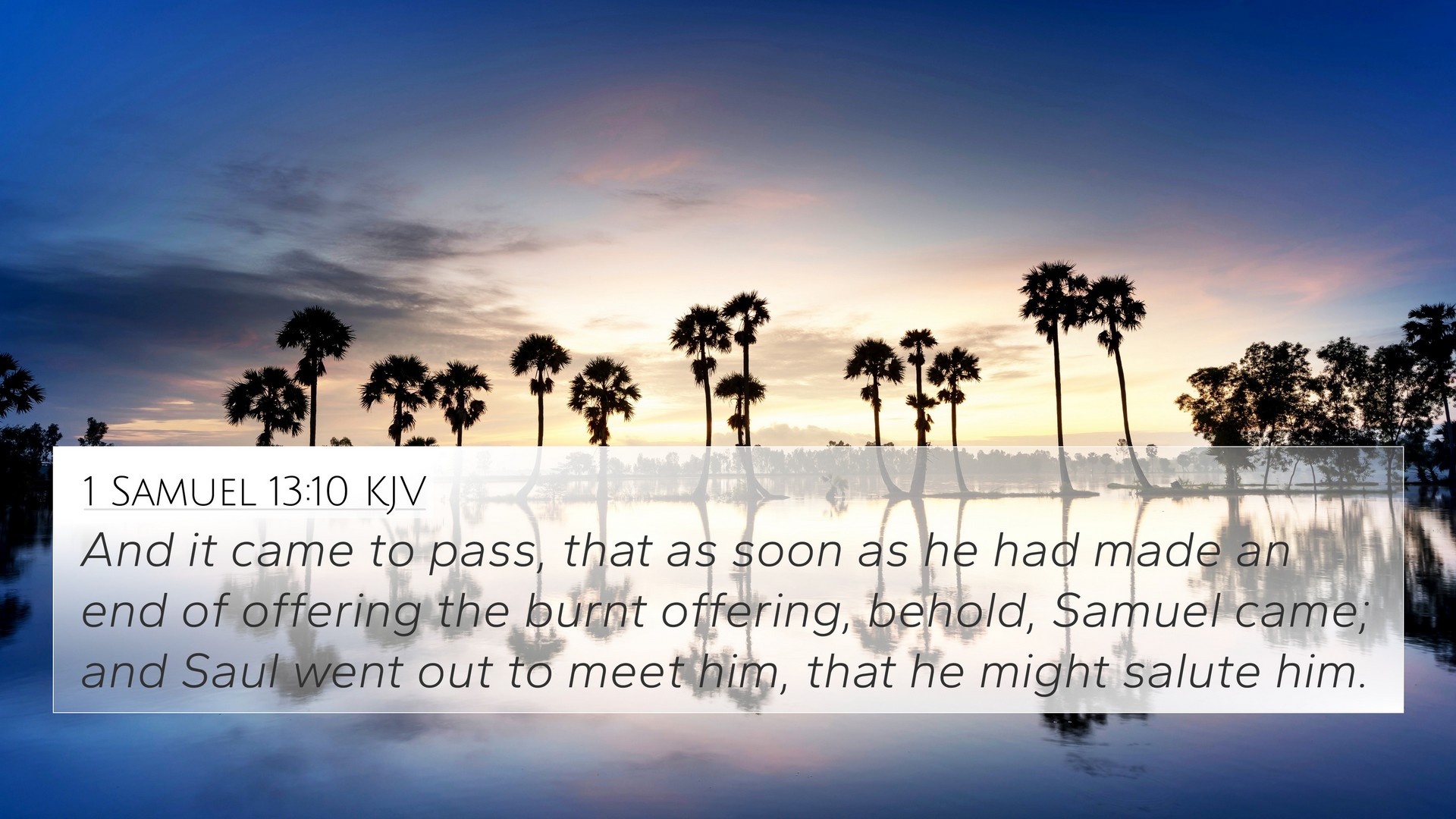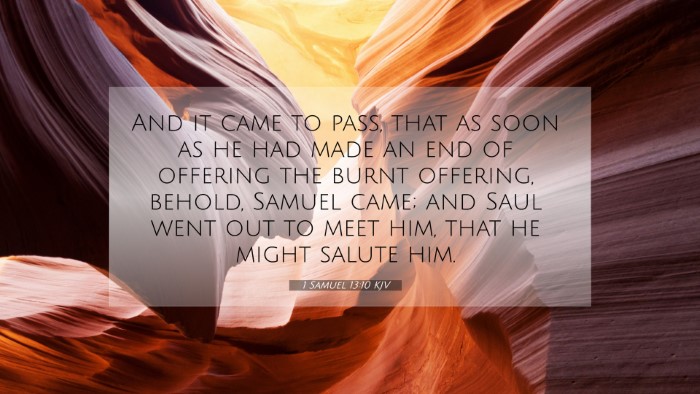Meaning and Interpretation of 1 Samuel 13:10
Verse Reference: 1 Samuel 13:10 - "And it came to pass, that as soon as he had made an end of offering the burnt offering, behold, Samuel came; and Saul went out to meet him, that he might salute him."
Overview
This verse captures a pivotal moment in the life of Saul, the first king of Israel, highlighting the consequences of his actions and the importance of obedience to God's commands. The verse serves as an introduction to a significant event that tests Saul's kingship and relationship with God.
Commentary Insights
Matthew Henry's Commentary
Henry emphasizes the impatience of Saul, suggesting that his decision to offer sacrifices without waiting for Samuel reflects a deeper spiritual issue. The act of offering without divine instruction signifies a breach of God's law and demonstrates a lack of reverence for the prophetic role.
Albert Barnes' Commentary
Barnes notes that Saul's actions were a critical error, indicating that the king acted foolishly by taking priestly duties upon himself. This transgression would have dire ramifications for Saul's reign, symbolizing the danger of stepping outside one's divinely appointed role.
Adam Clarke's Commentary
Clarke provides insight into the cultural context, stating that the role of priesthood was sacred, and Saul's usurpation of this office leads to severe consequences. This event foreshadows the loss of Saul's leadership and reflects the theme of divine rejection of those who disobey God's commands.
Thematic Connections
This scripture echoes messages found throughout the Bible regarding obedience, leadership, and the significance of waiting on God. The following themes are intertwined with 1 Samuel 13:10:
- Obedience to God's Command: Saul's failure to obey directly correlates with 1 Samuel 15:22, where obedience is deemed more acceptable than sacrifices.
- The Role of Leadership: The dangers of overstepping boundaries as a leader are echoed in James 3:1, which warns against many teachers.
- Waiting on the Lord: This is a recurring theme, seen in Psalms 27:14 and Isaiah 40:31, emphasizing patience and trust in God's timing.
- Divine Rejection: Saul’s rejection as king can be compared with 1 Chronicles 10:13-14, where God chooses David instead due to Saul's disobedience.
- Consequences of Impatience: The notion that haste can lead to downfall is seen in Proverbs 19:2.
- Prophetic Authority: The importance of recognizing God's prophetic voice is mirrored in Hebrews 1:1-2, where God speaks through prophets and ultimately through His Son.
- Spiritual Leadership: The conversation about fitting roles can be seen in Hebrews 5:4, which discusses the divine ordination of priests.
- Kingdom Leadership: The qualifications and behaviors of leadership are discussed in 1 Timothy 3:1-7.
Cross-References
Below are selected Bible verses that establish connections and parallels to 1 Samuel 13:10:
- 1 Samuel 15:22 - Obedience vs sacrifices.
- 1 Chronicles 10:13-14 - God’s rejection of Saul.
- Psalms 27:14 - The importance of waiting on the Lord.
- James 3:1 - Warning against many teachers.
- Isaiah 40:31 - Renewing strength through waiting on God.
- Hebrews 1:1-2 - Prophetic communication from God.
- Hebrews 5:4 - The divine calling of priests.
- Proverbs 19:2 - Caution about hasty decisions.
- 1 Timothy 3:1-7 - Standards for kingdom leadership.
- Exodus 28:1 - The divine selection of priests.
Application and Reflection
When reflecting on 1 Samuel 13:10, it is crucial to internalize the themes of patience, obedience, and respect for divinely established roles. Saul's story serves as a cautionary tale for those in positions of leadership and influence.
- Patience in Leadership: Recognize the importance of waiting for God’s timing.
- Obedience to God's Commands: Always prioritize divine directives over personal judgment.
- Understanding Roles: Acknowledge the specific roles set by God and avoid usurping them.
Conclusion
1 Samuel 13:10 teaches us valuable lessons about leadership, respect for God’s order, and the perils of impatience. By understanding and cross-referencing this verse with related scriptures, believers can deepen their insight into God’s expectations and the serious nature of obedience.





